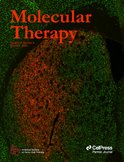The Vector
Volume 12, Issue 8: August 2023
Editorial Team
Karen Bulaklak, PhD – Editor, The Vector
Jon Brudvig, PhD – Associate Editor, The Vector
Jessica Schneller, PhD – Junior Editor, The Vector
Inside This Issue
Leadership Message
Breaking Through
From Molecular Therapy
Society News
Career Center
Public Policy
Industry News
Leadership Message
Kick Off the Policy Summit with Dr. Nicole Verdun

Hello ASGCT members,
I hope you’re doing well. If you attended the Spotlight on Immuno-Oncology Conference in Seattle or virtually, thank you! We had some excellent conversations about where we are in immunotherapy and where we’re going in the future, and I look forward to learning more and continuing these discussions. If you joined us, please fill out the evaluation and let us know what you thought. If you’d like to re-watch anything from the conference, all attendees have on-demand access to the virtual platform through Sept. 1. You can also register through that date to watch on demand if you haven’t.
Meanwhile, we have plenty of other events and opportunities happening, including globally. On Aug. 30, we’re holding an event in collaboration with the Australasian Gene and Cell Therapy Society (AGCTS) as part of our Around the World series. Speakers at this event will discuss their research and current advances in CGT in Australia. We’re also continuing our collaboration with Tanzania's Muhimbili University of Health and Allied Sciences (MUHAS) to hold our second Global Gene Therapy Training course. If you are, or you know, a full-time academic faculty member at an accredited university or medical school in sub-Saharan Africa, learn more about the program.
Next month, we’ll be back in Washington, D.C. for our fifth annual Policy Summit. We’re looking forward to hearing from Nicole Verdun, MD, the newly announced director of FDA’s Office of Therapeutic Products (OTP). Dr. Verdun will kick off the first day of the Policy Summit with a fireside chat about her office’s plans to accommodate growth in the CGT field and how to continue supporting development of innovative, novel products under their regulatory jurisdiction. We’ll also welcome speakers from the Center for Medicare & Medicaid Innovation, Foundation for the National Institutes of Health, Congressional offices, and more. View the program here and register early if you’re coming in person, as space is limited.
Enjoy the rest of your summer!
Sincerely,
Jeffrey Chamberlain, PhD
ASGCT President
Breaking Through
Genome editing in the mouse brain with minimally immunogenic Cas9 RNPs
Stahl, EC, Sabo JK, Kang MH, Allen R, Applegate E, Kim SE, Kwon Y, Seth A, Lemus N, Salinas-Rios V, Soczek KM, Trinidad M, Vo LT, Jeans C, Wozniak A, Morris T, Kimberlin A, Foti T, Savage DF, Doudna JA
DOI: https://doi.org/10.1016/j.ymthe.2023.06.019
Summary by Jessica Lee Schneller, PhD
Genome editing of somatic cells represents the next generation of treatment for genetic diseases of the central nervous system (CNS), but targeting cells in the brain for therapeutic editing remains challenging. Here the authors describe further characterization of cell-penetrating Cas9 ribonucleoproteins (RNPs) which are capable of efficient genome editing of mouse neurons in vitro and in vivo.
In this study, the Cas9 RNPs demonstrated editing in primary human cells, with improved editing of mouse striatum using a convection-enhanced delivery (CED) method. The RNPs were also compared to adeno-associated virus serotype 9 (AAV9), currently the most clinically relevant delivery system for targeting the CNS. RNPs expressing Cas9 from both the Streptococcus pyogenes (SpyCas9) and Staphylococcus aureus (SauCas9) systems were produced in E.coli; due to the packaging limitations of AAVs, the Cas9 system from Staphylococcus aureus was designed to fit into a single AAV expressing a guide RNA targeting the tdTomato locus. Editing was observed in neural precursor cells (NPCs) from Ai9 mice with all constructs in vitro and was also observed in human NPCs derived from induced pluripotent stem cells (iPSCs) using RNPs expressing SpyCas9 targeting the EMX1 gene. To improve upon delivery of the Cas9 RNPs by localized intraparenchymal injection, a CED system was used. This system generates a pressure gradient which improves biodistribution of macromolecules in the brain. CED injections into the mouse striatum were used to compare SpyCas9 RNPs genome editing to AAV9-delivered SauCas9. At 21 and 90 days post-injection, the Cas9-AAV demonstrated greater total edited striatal volume than the Cas9 RNP; however both delivery methods showed comparable editing of neurons within a given area of striatal tissue. The immune response was also compared between the RNPs and AAVs; it was found that both methods resulted in activation of immune responses in the brain and periphery, though with small effect sizes compared to sham-treated controls. To consider whether reducing endotoxins would improve host immune response to RNPs in vivo, CED bilateral intrastriatal injections were performed comparing lab-produced “standard” RNPs to industrially-produced “optimized” SpyCas9 RNPs. The optimized RNPs did not induce microglial activation but demonstrated lower edited striatal volume than the “standard” lab-produced RNPs. In conclusion, the results established RNPs as a complementary genome editing system with improved immunogenicity outcomes, further corroborating RNPs as an effective alternative to a viral vector delivery system.
From Molecular Therapy

Active Calls for Papers
RNA and epigenetic editing: A new generation of precision therapeutics
Novel therapeutic targets and biomarker development
Apply to Be Next Editor of MTMCD
ASGCT is looking for the next editor-in-chief of Molecular Therapy - Methods & Clinical Development (MTMCD) to begin a five-year term Jan. 1. Learn more + apply here.
Latest MT issues: Check out the most recent issues of these Molecular Therapy family journals:
Society News
ASGCT Insights Returns for Full Week in October
Register now for five, two-hour sessions the week of Oct. 16! Attend sessions focused on top Annual Meeting abstracts, risk assessments of gene therapy vectors and gene-editing technologies, treating genetic diseases prior to birth, and innate immune responses. Learn more about each event and secure your spot.
Apply Next Week for Congressional Policy Fellowship
Starting Aug. 15, apply for a year-long opportunity to influence policy on Capitol Hill! In partnership with AAAS, we'll select one applicant to provide science-based, independent guidance to federal policymakers in Washington, D.C.. Further your professional development while also advancing the Society's mission; learn more here.
Career Center
Are you looking for a job in the field of gene and cell therapy? Check out the new ASGCT Career Center for great opportunities with industry, government, and academic organizations. Sign up to receive alerts for open jobs in your area.
If you're from a recruiting institution, advertise in the Featured Jobs section to target the 5,500+ audience of The Vector.

Featured Jobs
Public Policy
Bipartisan Sickle Cell Disease Briefing Focuses on Role of CGTs
ASGCT recently co-hosted a briefing on Sickle Cell Disease (SCD) with Senators Corey Booker (D-NJ) and Tim Scott (R-SC). This event brought together researchers, physicians, patient advocates, and industry developers to discuss different perspectives on the current treatment landscape for SCD – and the role CGTs will play in the future. The Society is committed to educating lawmakers on the innovative potential and practical hurdles of CGTs, and appreciates the speakers for a productive conversation:
-
Dr. Hans-Peter Kiem, ASGCT Immediate Past President + Director, Stem Cell and Gene Therapy Program, Clinical Research Division, Fred Hutch Cancer Center
-
Dr. Andrew Campbell, Director, Comprehensive Sickle Cell Disease Program, Children's National Hospital
-
Nasir and SueAnne, an SCD warrior and his mom
-
Clark Paramore, Vice President, Value Demonstration and Access Strategy, bluebird bio
-
Dr. Matt Porteus, Sutardja Chuk Professor of Definitive and Curative Medicine, Stanford Medical School
Society Supports Advanced Manufacturing for Efficient CGT Development
ASGCT recently submitted feedback to FDA following their public workshop, Advancing the Utilization and Supporting the Implementation of Innovative Manufacturing Approaches. Our comment letter emphasizes the need to support advanced manufacturing technologies (AMTs) to streamline the development process for CGTs.
Currently, the lack of standardization and the reliance on complex, customized manufacturing approaches present significant challenges in ensuring the availability of safe and effective therapies. ASGCT comments stress the need for a clear and predictable regulatory process that would enable the review and adoption of AMTs. By doing so, scalability, consistency, and cost-effectiveness in CGT development would improve, ultimately leading to quicker patient access to transformative treatments. The Society urges FDA to provide clear guidance and support for the adoption of these technologies. By addressing these important recommendations, the CGT field can achieve enhanced efficiency, increased capacity, improved standardization, and accelerated development of transformative therapies, ultimately benefiting patients in need.
Second Installment of CGT Science Series Highlights Gene Editing Technologies
The Biotechnology Innovation Organization (BIO) hosted the second Cell and Gene Therapy (CGT) Science Series, a quarterly seminar series focused on scientific topics related to cell and gene therapy products. The CGT Science Series is intended to foster scientific exchange between BIO, ASGCT, and the Center for Biologics Evaluation and Research (CBER) review staff on a variety of topics that span the CGT product lifecycle.
The second episode of the series featured Jing Liao, Director of Vector Development and Operations at Alexion Pharmaceuticals. Dr. Liao received her PhD in stem cell biology and has since worked in industry using conventional homologous recombination or TALENs, CRISPR/Cas9 technology in order to create straight knockout, conditional knockout or knock-in cell lines or knockout mouse models. This session discussed the potential of new gene editing technologies and their ability to re-write DNA for the treatment of genetic disorders.
Proposed Changes to MDRP Require Additional Reporting From Manufacturers
CMS released a proposed rule that aims to modify the Medicaid Drug Rebate Program (MDRP), established. The proposed rule includes provisions that would require drug manufacturers to undergo additional audits and surveys and provide more information to CMS regarding various factors such as manufacturing and research and development costs. Notably, the proposed rule acknowledges the significance of CGTs, which offer transformative therapeutic benefits but come with high upfront costs.
ASGCT submitted comments on this proposed change, expressing concerns about proposed regulatory updates to the MDRP. ASGCT believes these policies could negatively impact beneficiaries’ access to life-changing gene and cell therapies. Comments highlight three specific concerns: the burdensome drug price verification surveys on manufacturers; the potential access challenges from modifying the definition of "covered outpatient drug;" and the inaccuracies of applying price concessions (stacking) in calculating Medicaid best price. These policies could hinder patient access, limit outcomes-based arrangements, and complicate the market, all of which are critical to advancing genetic and cellular therapies to alleviate human disease.
Nicole Verdun Named Director of FDA's Office of Therapeutic Products
Nicole Verdun, MD, former director of the Center for Biologics Evaluation and Research’s Office of Blood Research and Review, has been appointed as the new director of the Office of Therapeutic Products (OTP) at the US Food and Drug Administration (FDA). She assumed the position on July 30, succeeding Wilson Bryan. Verdun, a board-certified pediatric hematologist and oncologist, joined the FDA in 2012 and has since held various positions within the agency. OTP is a growing super office handling the increasing workload related to cell and gene therapy products, and it has several leadership positions that remain staffed on an acting basis.
The appointment of Verdun represents a victory for the FDA's recruitment efforts amid retirements and departures within the agency. Dr. Verdun will likely be tasked to fill and recruit many vacant positions within OTP. It is especially encouraging to see progress made in these PDUFA VII commitments given recent issues with reviewer staffing shortages.
Industry News
Interested in advertising in The Vector?
View the Rate Sheet